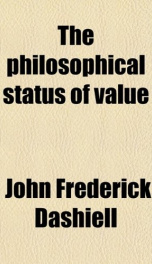the philosophical status of value

Purchase of this book includes free trial access to www.million-books.com where you can read more than a million books for free. This is an OCR edition with typos. Excerpt from book: CHAPTER THREE Muensterkerg's Theory Of Value In "Eternal Values",1 written by Professor Hugo Mtinster- berg as an edition in English of his "Philosophic der Werte", 2 we find a decidedly different attack on the problem of values. Our author surveys the work of science and its findings. Physics treats of things as just things, psychology treats of psychic contents as just contents, and the scientific method is to examine only such facts in their bare fact-status, not as elements in systems of significances and meaning. Truly the work of natural science is magnificent; but can we rest here ? And in the true Fichtean spirit, Professor Miinsterberg rises up against such constructions as final views of life, asserting the importance, the necessity, of values. Instead of being "imbedded helplessly into a blind accidental game", we must claim a greater birthright. The duty of philosophy, then, becomes that of seeking by clear conceptions, and conscious purposive labor, to show what it means to have valuesto show that they are absolute and eternal. Miinsterberg's purpose is accordingly to show that values are eternal, that it all rests in one great absolute value. What does the very fact of values imply? It implies always some intentions, purposes, attitudes, some desires and aversions of our active life. But these are all manifestations of will; it is in the fulfillment of our will that our truest satisfaction is found. The secret of our life, then, is to be found in our will; and the fundamental absolute valuation is to be found in the essence of will, namely, the assertion of identity among changing experiences. "If life were nothing but a momentary flash, if no instant referred beyond itself, if no content remained beyond the flying experience, life would have no meaning an...
Info about the book
Author:
Series:
Unknown
ISBN:
0199756775
Rating:
5/5 (2)Your rating:
0/5
Languge:
English
Users who have this book
Users who want this book
What readers are saying
What do you think? Write your own comment on this book!
write a commentif you like the philosophical status of value try:
Other books by this author
Do you want to exchange books? It’s EASY!
Get registered and find other users who want to give their favourite books to good hands!

